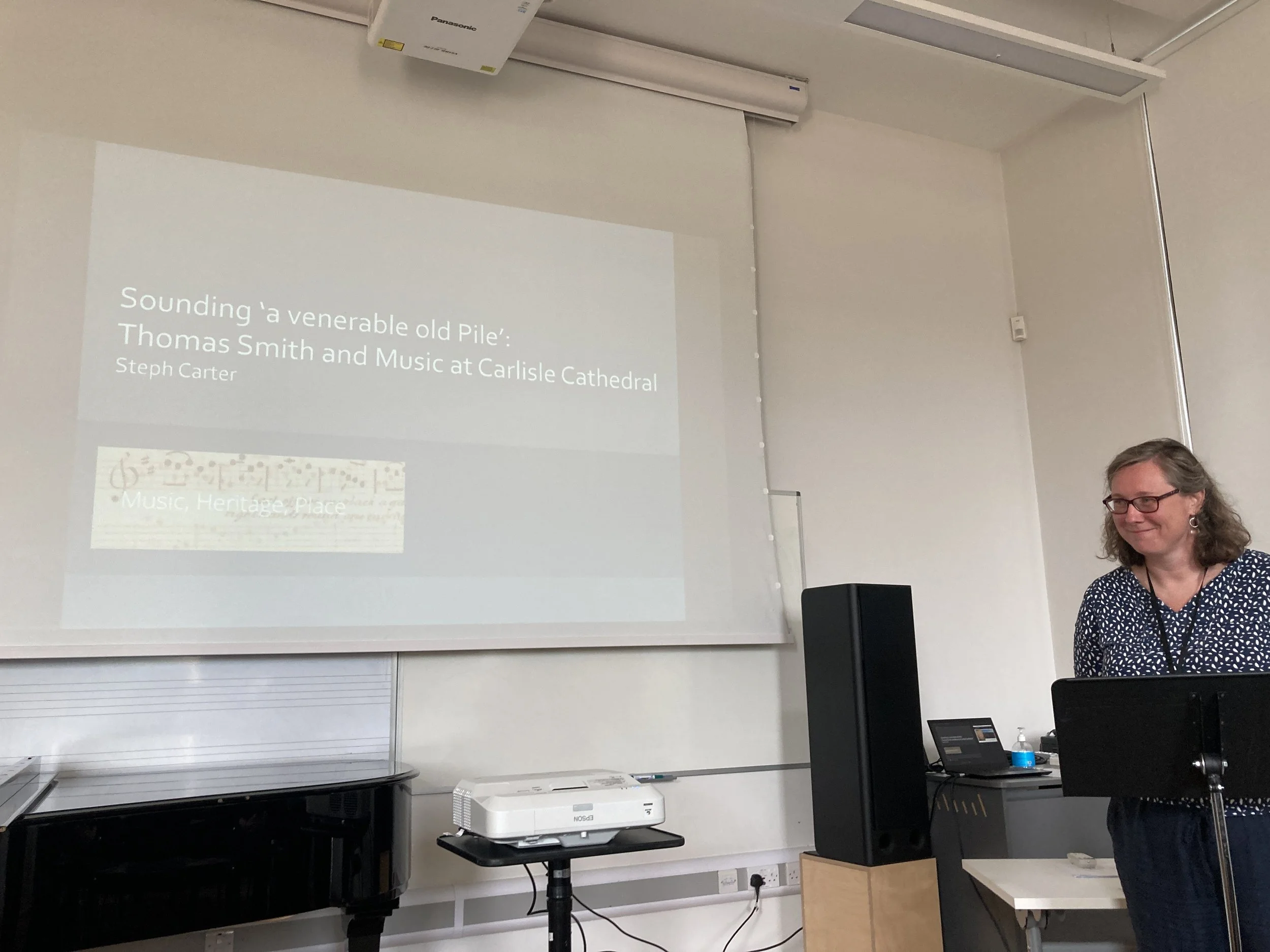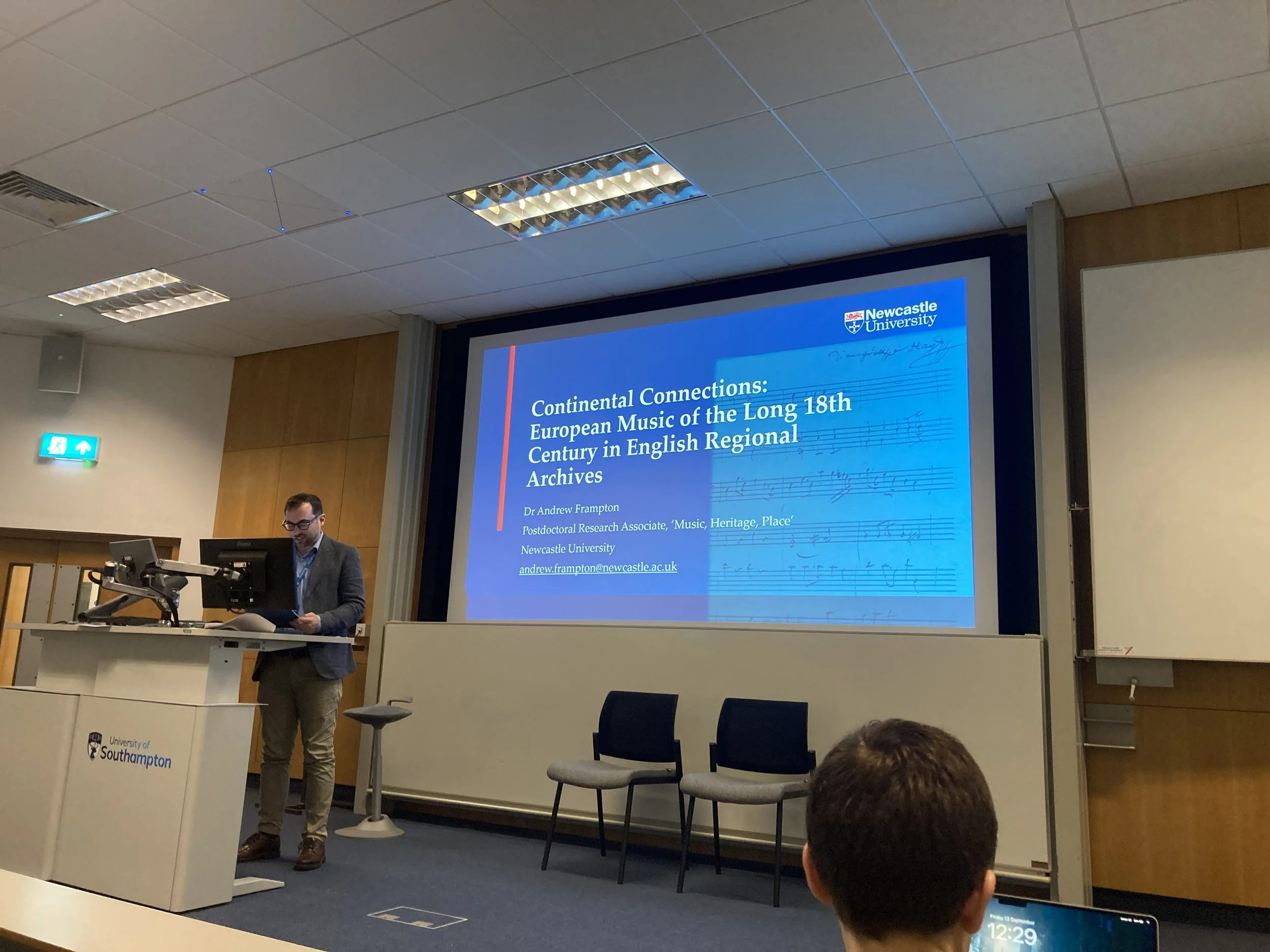Drawing the threads together
Updates from MHP team’s conference travels
This summer, the Music, Heritage, Place team attended the Medieval & Renaissance Music Conference 2025 (MedRen), the Biennial International Conference on Baroque Music, and the Royal Musical Association Annual Conference. MedRen was hosted by Newcastle University, Durham University, and Northumbria University (located in Newcastle). The portion hosted by Newcastle was organised in part by project co-investigator Kirsten Gibson, alongside Magnus Williamson. The Biennial Baroque conference was hosted by the Royal Birmingham Conservatoire, while the Royal Musical Association conference was hosted by Southampton University.
At MedRen, Caro Lesemann-Elliott presented on a round table chaired by Kirsten Gibson. The round table also included members of the project Dissemination, Ownership, and Reading of Music in Early Modern Europe (DORMEME) (Elisabeth Giselbrecht, Louisa Hunter-Bradley, and Katie McKeogh). Titled ‘Notated music in unexpected places’, the round table discussed how the MHP and DORMEME projects had extended approaches for where we look for early modern notated music, and how this music is situated historically The place of notated music books, previously revered as some of the most authoritative sources, has rightly been questioned over the past decades, given growing awareness of the importance of oral and memorised transmission. In light of this change, the MHP and DORMEME teams explored how expectations and biases regarding ownership and users of notated sources compare with historical evidence, and how we can broaden our research horizons accordingly.
Caro presenting in Newcastle on notated sources c1500-1600 from Essex and Cornwall
Caro also gave an individual paper at MedRen (‘Building the Musical Reliquary: medievalism and construction of the ‘other’ British musical miscellanies, c.1800’). The paper explored the contexts of Edward Jones’s Musical and poetical relicks of the Welsh bards (1784/94) and Davies Gilbert’s Some ancient Christmas carols (1822/3), focusing on how notions of Welsh and Cornish traditions were represented in these respective publications. It discussed how these arguably medievalist publications reflect (and act as) instances of the colonial lens turned inwards.
Steph and Kirsten at the DCDC conference in Durham
In between conferences, Kirsten and Steph also presented a poster at the ‘Discovering Collections, Discovering Communities’ conference at Durham University (also accessible online via Pheedloop) on 31 July. The conference brought together delegates from across the world who work in galleries, libraries, archives, and museums sector, as well as higher education. Their poster presented some of the highlights of the project’s research, and offered the wide array of attendees the chance to learn more about the team’s work.
Biennial Baroque in Birmingham saw an entire half day dedicated to the MHP project, with full audiences for each paper. Almost the whole team presented on a variety of topics, apart from co-investigator Nancy Kerr, who was preparing for (and delivering) project performances at festivals across the country. You can read about some of her recent work on her blog post here; be sure also to check out Warwick Folk Festival, Folk by the Oak, and Shrewsbury Folk Festival to learn more!
Our session opened with a presentation from Stephen Rose, who introduced the project, and highlighted some exciting, groundbreaking discoveries by members of the MHP team concerning the music of Henry Purcell, its transmission and transformations across early modern England. A paper by Kirsten Gibson explored the music library formerly belonging to the Brownes of Troutbeck in Westmorland (in the Lake District), an aspirational family in an 18th-century farming community with moderate amounts of social capital and assets. The paper examined the materiality of the Brownes’ books and the music contained within them, and set them against wider contexts of sociability, particularly by drawing on surviving family papers and contemporaneous music manuscripts (including psalm tunes copied by members of the Brownes’ extended family).
The project’s post-docs all gave papers, starting with Steph’s presentation on music at Carlisle Cathedral under Thomas Smith (1614-1702), Dean (and later, Bishop) of Carlisle. Steph explored how Smith’s endowment to re-establish the lost Cathedral Library, alongside evidence regarding his activities and surviving book collection, indicate an active clergyman interacting with music for liturgical enrichment at Carlisle. Her paper contributed to a growing body of evidence demonstrating the importance of clergy in musical dissemination, exchange and practice in early modern England. Caro’s paper explored the role of musical clocks and time-keeping instruments (such as bells and chimes) in the production of space and time in 18th-century rural England. It focused on a collection of notated music and technical notes that belonged to a family of clockmakers and Baptist religious leaders in rural Leicestershire. The paper explored the collection as witness not only to intersections of musicianship and technology, but to processes of community-building in the wake of extreme social rupture and intra-community violence.
Steph presenting in Birmingham on the ‘venerable old Pile’ of music at Carlisle Cathedral in the 17th century
Andrew’s paper explored hitherto unknown eighteenth-century Handel sources found in the record offices of Derbyshire, Staffordshire, and West Yorkshire. Andrew illustrated the translocality of Handel’s music, exploring how it was collected and arranged to suit local tastes and needs. Andrew also highlighted oratorio excerpts, and local works that appear to draw on pieces by Handel as parody material.
Andrew presenting in Southampton on continental music in house libraries of rural 18th-century English gentry
The final conference of the summer featured papers by Stephen, Caro, and Andrew at the Royal Musical Association conference in Southampton. The session kicked off with a paper by Stephen Rose introducing the project, then exploring why and how local names were added to psalm tunes (such as ‘Oxford’ or ‘Wareham’) and to printed or manuscript anthologies such as Rutland Harmony and Shropshire Harmony. Caro’s paper investigated how 18th-century bespoke publications of psalms and anthems can be understood as hybrid sources and in relation to evidence of local conflicts over singing, space and place in parishes, using examples from the 1730s and 1740s in Gillingham (Dorset) and Sowe (Warwickshire). Andrew elaborated on his Biennial Baroque paper, exploring the enactment of translocality in music collections as evident in the case studies from 18th-century Derbyshire, Staffordshire and West Yorkshire, with an emphasis on the creative processes of arrangement and adaptation within the materiality of these sources.
We still have much left to explore, but the team has finished conference and festival season on many high notes; figuratively and literally!



